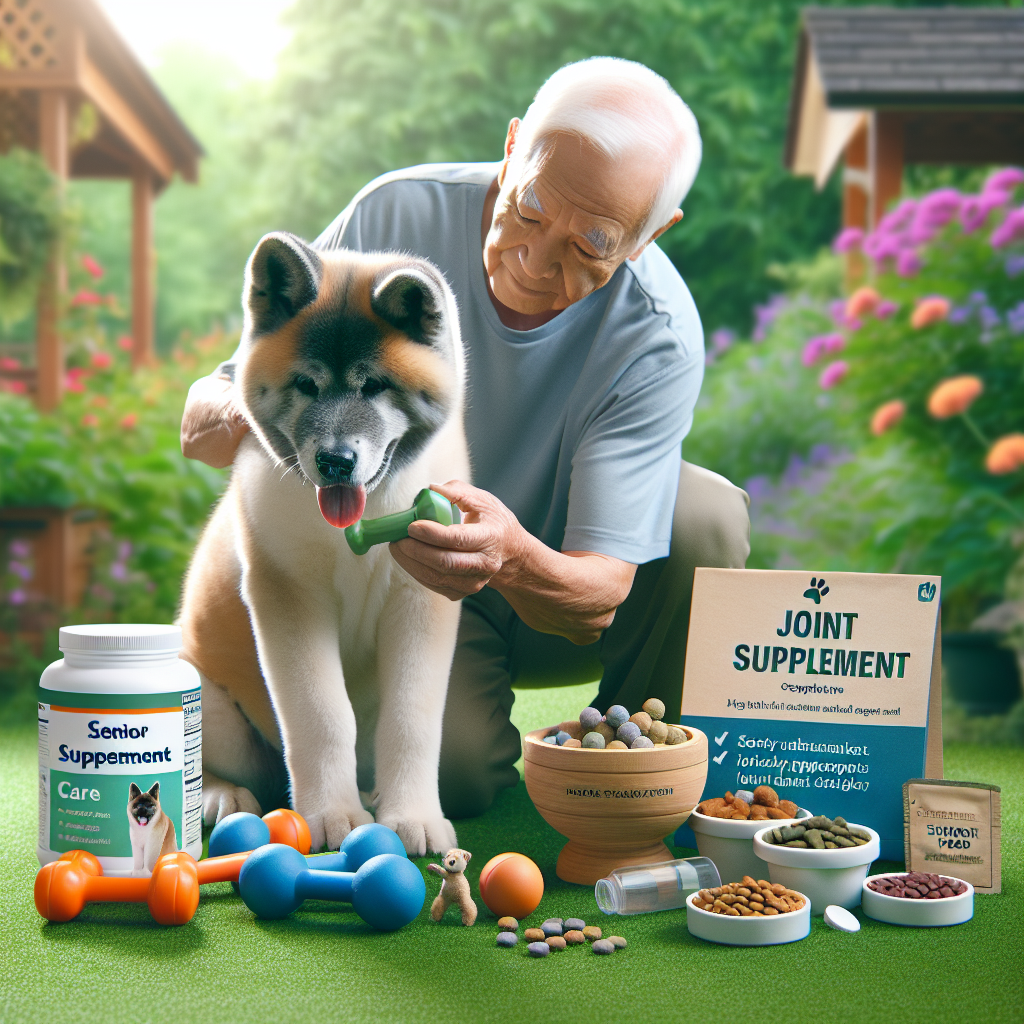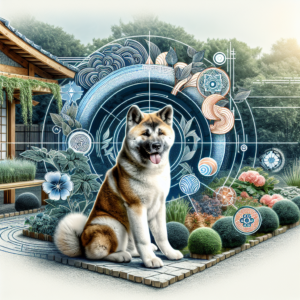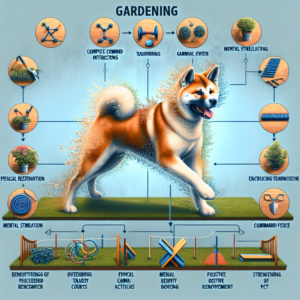Contents
Introduction
As your Akita dog ages, it is essential to provide them with the best care to ensure they live out their golden years with comfort and joy. Senior dogs, like people, undergo physical and mental changes that require special attention. The Akita breed, known for its strength, intelligence, and loyalty, may face unique challenges as they grow older. These challenges include age-related physical conditions, changes in cognitive function, and evolving dietary needs. However, with the right approach, you can help your Akita age gracefully while maintaining their quality of life. This comprehensive guide will explore the unique care requirements of older Akitas, offering insights on physical health, mental stimulation, and dietary considerations to help your dog thrive in their senior years.
Physical Health in Senior Dogs
Common Physical Health Issues
As your Akita dog ages, you may notice changes in their physical condition. Senior dogs, including Akitas, often face several common health problems due to the natural aging process. Some of these issues include:
- Arthritis and Joint Problems: One of the most common concerns for senior Akitas is arthritis. This degenerative joint disease can cause stiffness, pain, and reduced mobility. Akitas, due to their size and weight, may be more prone to hip dysplasia and elbow dysplasia, which can worsen with age.
- Reduced Muscle Mass: Aging Akitas may experience a decrease in muscle mass, making it harder for them to move comfortably and maintain their strength.
- Obesity: As Akitas age, they may become less active, leading to weight gain. Obesity can put additional strain on their joints and exacerbate existing health conditions like arthritis.
- Dental Problems: Older Akitas are more susceptible to dental issues, including gum disease and tooth loss, which can affect their overall health and comfort.
Maintaining Comfort and Mobility
While aging brings inevitable physical changes, there are several ways to ensure your Akita remains comfortable and mobile in their senior years.
- Regular, Low-Impact Exercise: Exercise is crucial for maintaining joint health, but it’s essential to adjust the intensity and type of exercise as your Akita ages. Focus on low-impact activities such as short, gentle walks and swimming. Swimming, in particular, is an excellent option as it allows for exercise without putting pressure on the joints.
- Joint Supplements: Joint supplements containing glucosamine, chondroitin, and omega-3 fatty acids can help support joint health and reduce inflammation. Talk to your veterinarian about adding these supplements to your Akita’s daily routine.
- Comfortable Bedding: Provide your Akita with soft, supportive bedding that alleviates pressure on their joints. Orthopedic dog beds are an excellent choice for senior dogs, as they help with pain management and improve sleep quality.
- Weight Management: To avoid putting undue strain on your Akita’s joints, it’s important to maintain a healthy weight. If your Akita has gained weight, work with your veterinarian to adjust their diet and exercise routine to help them lose any excess pounds.
Mental Stimulation for Seniors
Importance of Mental Stimulation
Just as physical health is critical for senior Akitas, so too is mental stimulation. Aging dogs can experience cognitive decline, similar to conditions like dementia in humans. This decline may result in memory loss, confusion, or changes in behavior, making it all the more important to engage your Akita’s mind regularly.
Mental stimulation is beneficial for maintaining cognitive function and preventing boredom, which can lead to behavioral issues such as excessive barking or destructive behavior. Additionally, staying mentally engaged helps your Akita retain a sense of purpose and connection to their environment, which can improve their overall well-being.
Brain-Boosting Activities
Providing mentally stimulating activities is crucial for senior Akitas. Here are some effective brain exercises to keep your dog’s mind sharp:
- Interactive Toys: Puzzle toys and treat-dispensing toys are excellent for stimulating your Akita’s problem-solving abilities. These toys challenge your dog to figure out how to access treats, keeping them engaged and mentally sharp.
- Scent Work: Akitas have an excellent sense of smell, and scent-based activities can be a fun and stimulating way to engage your dog. You can hide treats or toys around your home or yard and encourage your Akita to search for them. This type of activity is not only mentally stimulating but also taps into your dog’s natural instincts.
- Training Sessions: Even in their senior years, Akitas benefit from learning new commands or tricks. Short, positive training sessions that involve basic obedience or fun tricks can help keep your dog’s brain active and strengthen the bond between you and your dog.
- Interactive Play: Simple games like fetch, tug-of-war, or hide-and-seek can be modified for senior dogs. If your Akita has joint problems, use softer toys or adjust the intensity of play to match their comfort level.
Regular Mental Challenges
Providing a consistent routine that includes a variety of mental challenges will help your Akita stay mentally engaged. Rotating puzzle toys and introducing new challenges can prevent your dog from becoming bored and will ensure their brain stays sharp.
Diet and Nutrition
Dietary Considerations for Senior Akitas
As your Akita ages, their dietary needs will change to support their slowing metabolism, reduced activity level, and increasing susceptibility to health issues like arthritis and obesity. Providing the right nutrition is essential for ensuring your senior Akita remains healthy, active, and comfortable.
- Portion Control: Senior Akitas may require fewer calories than younger dogs due to decreased activity levels. It’s important to monitor their weight and adjust portion sizes to prevent obesity, which can exacerbate joint issues. Overfeeding your senior Akita can lead to weight gain and strain their already aging joints, so consult your veterinarian about the appropriate amount of food.
- Senior-Specific Dog Food: Many high-quality dog food brands offer formulas designed specifically for senior dogs. These formulas are typically lower in calories and fat while containing higher levels of fiber, antioxidants, and joint-supporting nutrients. Senior-specific foods are also often easier to digest, which can benefit older Akitas with sensitive stomachs.
- Nutrient Balance: Focus on providing a balanced diet that includes high-quality protein to maintain muscle mass, healthy fats to support joint health, and fiber to aid digestion. Omega-3 fatty acids, found in fish oils, are particularly beneficial for joint health and reducing inflammation, making them an excellent addition to a senior Akita’s diet.
- Hydration: Older dogs may not drink as much water as they should, leading to dehydration, which can affect their overall health. Ensure that your Akita always has access to fresh water, and encourage them to drink throughout the day. Wet food can also be an option to increase hydration if your Akita is reluctant to drink enough water.
Supplements for Senior Dogs
In addition to senior-specific dog food, you may consider adding supplements to your Akita’s diet to address specific age-related health concerns:
- Joint Supplements: As mentioned earlier, glucosamine and chondroitin can help support joint health, reduce inflammation, and manage arthritis pain. These supplements are available in various forms, including chewable tablets, powders, and liquid formulations.
- Omega-3 Fatty Acids: Omega-3 supplements are beneficial for reducing inflammation and promoting healthy skin, coat, and joints. Fish oil is a popular choice, and it can be added to your Akita’s meals.
- Antioxidants: Antioxidants such as vitamins C and E can help fight oxidative stress and support immune function in aging dogs.
Special Diets for Health Conditions
If your Akita has specific health issues such as kidney disease, diabetes, or gastrointestinal sensitivities, your veterinarian may recommend a specialized diet. Many senior dogs develop health conditions that require tailored nutrition, so always consult with your vet to determine the best dietary plan for your individual dog.
Conclusion
Caring for your senior Akita involves understanding the physical, mental, and nutritional changes that come with aging and adjusting their care accordingly. By providing the right diet, engaging mental exercises, and addressing common health concerns such as arthritis or obesity, you can help your Akita live out their senior years comfortably and joyfully. Regular veterinary check-ups, joint supplements, and plenty of love and attention will ensure your Akita enjoys a fulfilling life as they age gracefully. With proper care and a little extra attention, your Akita can continue to be a loyal and cherished companion for many years to come.


